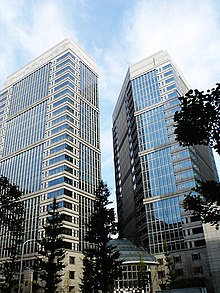Nippon Telegraph and Telephone
 | |
 NTT Headquarters | |
Native name | 日本電信電話株式会社 |
|---|---|
Romanized name | Nippon Denshin Denwa Kabushiki-gaisha |
| Formerly | Nippon Telegraph and Telephone Public Corporation 日本電信電話公社 |
| Type | 1985-Present: Public KK 1952-1985: Statutory corporation |
| |
| Industry | Telecommunications |
| Predecessor | Japanese telecommunications network owned by the Ministry of Communications/Ministry of Telecommunications and administered by AT&T Corporation during the Occupation of Japan |
| Founded | August 1, 1952 (as government monopoly) April 1, 1985 (Private Company) |
| Founder | Government of Japan |
| Headquarters | Ōtemachi, Chiyoda, Tokyo, Japan |
Key people | Satoshi Miura (Chairman) Jun Sawada (President and CEO) |
| Products |
|
| Revenue | |
| Total assets | |
| Total equity | |
| Owner | Government of Japan (32.6% by law)[2] |
Number of employees | 303,350 (2021)[1] |
| Subsidiaries | NTT East NTT West NTT, Inc. NTT Communications (in Japan) (NTT Communications, Dimension Data, NTT Security etc) NTT Data NTT Docomo NTT Research NTT Urban Development |
| Website | group global |
The Nippon Telegraph and Telephone Corporation (日本電信電話株式会社, Nippon Denshin Denwa Kabushiki-gaisha), commonly known as NTT, is a Japanese telecommunications company headquartered in Tokyo, Japan. Ranked 55th in Fortune Global 500, NTT is the fourth largest telecommunications company in the world in terms of revenue,[3] as well as the fifth largest publicly traded company in Japan after Toyota, Mitsubishi Corporation, Honda and Japan Post Holdings, as of September 2019.[4]
The company is incorporated pursuant to the NTT Law (Law Concerning Nippon Telegraph and Telephone Corporation, Etc.).[5] The purpose of the company defined by the law is to own all the shares issued by Nippon Telegraph and Telephone East Corporation (NTT East) and Nippon Telegraph and Telephone West Corporation (NTT West) and to ensure proper and stable provision of telecommunications services all over Japan including remote rural areas by these companies as well as to conduct research relating to the telecommunications technologies that will form the foundation for telecommunications.
On 1 July 2019, NTT Corporation launched , an $11 billion de facto holding company business consisting of 28 brands from across NTT Security, NTT Communications and Dimension Data.[6]
While NTT is listed on the Tokyo Stock Exchange and the OTC Markets Group's Pink (and formerly in the New York Stock Exchange under the ticker code "NTT" and in the London Stock Exchange under the ticker code "NPN"), the Japanese government still owns roughly one-third of NTT's shares, regulated by the NTT Law.
History[]


Established as a state monopoly in August 1952 to take over the Japanese telecommunications system operated by AT&T during the Occupation of Japan[citation needed], Nippon Telegraph and Telephone Public Corporation (日本電信電話公社, Nippon Denshin Denwa Kōsha, shortened into Den-Den Kōsha (電電公社)) was privatized in 1985 to encourage competition in the country's telecom market. In 1987, NTT made the largest stock offering to date, at US$36.8 billion.[7][8]
Because NTT owns most of Japan's last mile infrastructure (incl. FTTC or FTTB/FTTH), it enjoys oligopolistic control over land lines in Japan. In order to weaken NTT, the company was divided into a holding company (NTT) and three telecom companies (NTT East, NTT West, and NTT Communications) in 1999. The NTT Law regulating NTT East and West requires them to serve only short-distance communications and obligates them to maintain telephone service all over the country. They are also obligated to lease their unused optical fiber (dark fiber) to other carriers at regulated rates. NTT Communications is not regulated by the NTT Law.
In July 2010, NTT and South African IT company Dimension Data Holdings announced an agreement of a cash offer from NTT for Dimension Data's entire issued share capital, in £2.12bn ($3.24bn) deal.[9]
In late 2010, NTT's Japan-to-US transpacific network reached 400 Gbit/s. In August 2011, its network capacity was expanded to 500 Gbit/s.[10]
Corporate history timeline[]
- 1952 Nippon Telegraph and Telephone Public Corporation established
- 1979 INS Concept announced
- 1985 Nippon Telegraph and Telephone Corporation (NTT) incorporated as a private company
- 1987 NTT listed on the First Section of the Tokyo Stock Exchange
- 1988 NTT DATA Corporation started operations
- 1990 VI&P Concept announced
- 1992 NTT Mobile Communications Network, Inc. (presently NTT DOCOMO) started operations
- 1994 Basic Concept for the Coming Multimedia Age announced
- 1995 NTT DATA listed on the Second Section of the Tokyo Stock Exchange
- 1996 21st Century R&D Vision announced
- 1996 NTT DATA listed on the First Section of the Tokyo Stock Exchange
- 1997 Digitization of communications network in Japan completed
- 1998 Global Information Sharing Concept announced
- 1998 NTT DOCOMO listed on the First Section of the Tokyo Stock Exchange
- 1999 NTT's operations reorganized into a holding-company structure: businesses transferred to three new wholly owned subsidiaries (NTT East, NTT West, and NTT Communications)
- 2002 prefecture-based subsidiaries of NTT East and NTT West started operations
- 2002 "Vision for a New Optical Generation" announced
- 2004 NTT Urban Development Corporation listed on the First Section of the Tokyo Stock Exchange
- 2004 "NTT Group's Medium-Term Management Strategy" announced
- 2008 announcement of a new Medium-Term Management Strategy: "Road to Service Creation Business Group"
Subsidiaries[]
NTT Group consists of the following major companies, divided into five segments. NTT East, NTT West, NTT Communications, NTT Docomo, and NTT Data are most major subsidiaries. NTT Docomo and NTT Data are listed on the stock markets. NTT Urban Development is a subsidiary involved in real estate.[11] NTT Communications' business outside of Japan became part of on 1 July 2019.[6]
Regional[]

- Nippon Telegraph and Telephone East Corporation (NTT East)
- Nippon Telegraph and Telephone West Corporation (NTT West)
Long distance and international[]
- NTT Communications
- Verio Inc
- NTT Europe
- HKNet
- Plala Networks
Mobile[]
- NTT Docomo
Data (system integration)[]
- Dimension Data (now part of NTT Ltd. except in the Middle East and Africa Region)[12]
- e-shelter[13]
- Gyron Internet Ltd
- NTT Data
- NTT Comware
- NTT Software
- NTT AT
- NTT IT
Information security[]
- NTT Security (now part of as of the 1st July 2019) .
R&D laboratories[]
- Service Innovation Laboratory Group
- Service Evolution Laboratories (Yokosuka)
- Media Intelligence Laboratories (Yokosuka)
- Software Innovation Center (Musashino and Shibaura)
- Secure Platform Laboratories (Musashino)
- Information Network Laboratory Group
- Network Technology Laboratories (Musashino)
- Network Service Systems Laboratories (Musashino)
- Access Network Service Systems Laboratories (Tsukuba and Yokoska)
- Energy and Environment Systems Laboratories (Atsugi)
- Science and Core Technology Laboratory Group
- Network Innovation Laboratories (Yokoska)
- Microsystem Integration Laboratories (Atsugi)
- Photonics Laboratories (Atsugi)
- Communication Science Laboratories (Keihanna and Atsugi)
- Basic Research Laboratories (Atsugi)
- NTT Research, Inc. (East Palo Alto, California)[14][15]
- Physics & Informatics (PHI) Laboratory
- Cryptography and Information Security (CIS) Laboratory
- Medical and Health Informatics (MEI) Laboratory
Sponsorship[]
- Omiya Ardija and Roasso Kumamoto (Japanese football clubs formerly affiliated with NTT)
- Dandelion Racing, Super Formula team affiliated with NTT Docomo.
- Chip Ganassi Racing in the IndyCar Series (affiliated with NTT Data, drivers include Ryan Briscoe, Tony Kanaan, Scott Dixon, Ed Jones, and Felix Rosenqvist). In 2019, NTT also became title sponsor of the series.[16]
- NTT Pro Cycling, UCI WorldTeam cycling team based in South Africa.
See also[]
- Telegraph
- Telephone
- List of telephone operating companies
References[]
- ^ Jump up to: a b c d e f "NTT Group Website". Nippon Telegraph and Telephone Corporation. Retrieved May 6, 2020.
- ^ "The Japanese Government Asset System and Current Conditions" (PDF). Ministry of Finance Japan. March 2019. Retrieved May 27, 2019.
- ^ "The World's Largest Public Companies". Forbes. Retrieved 2018-09-26.
- ^ "売上高ランキング". Nikkei (in Japanese). Retrieved 2020-01-26.
- ^ "English translation of the "Law Concerning Nippon Telegraph and Telephone Corporation, Etc."" (PDF).
- ^ Jump up to: a b Duckett, Chris. "Dimension Data, NTT Communication, and NTT Security bundled into NTT Ltd". ZDNet. Retrieved 2019-07-10.
- ^ Vartan, Vartanig G. (November 9, 1987). "Market Place; Big Stock Sale By Japanese". The New York Times.
- ^ "U.S. set to make $8 billion from bailing out Citi". 27 March 2010. Archived from the original on 29 March 2010.
- ^ "NTT buys South Africa's Dimension Data". BBC News. July 14, 2010. Retrieved July 14, 2010.
- ^ Sean Buckley, Fierce Telecom. "NTT's Japan to U.S. network route reaches 500 Gbps mark." Aug 3, 2011. Retrieved Aug 4, 2011.
- ^ Melby, Caleb (March 13, 2018). "Kushner Conflict Cloud Hovers Over Brooklyn Sale Linked to Japan". Bloomberg News.
A spokesman for the subsidiary, NTT Urban Development, said the company knew the deal involved Kushner Cos. The subsidiary describes itself as the real estate arm of NTT.
- ^ "Dimension Data is now NTT Inc - TechCentral". techcentral.co.za. Retrieved 2019-07-10.
- ^ "NTT Communications Acquires 86.7% Stake in e-shelter, Germany's top data-center operator".
- ^ "World-Class Research Center Opens in Palo Alto". Bloomberg.com. 2019-07-08. Retrieved 2019-11-20.
- ^ "World-Class Research Center Opens in Palo Alto". www.businesswire.com. 2019-07-08. Retrieved 2019-11-20.
- ^ "IndyCar Names NTT as IndyCar Series Title Sponsor, Official Technology Partner". Sports Video Group. Retrieved 2019-01-19.
External links[]
- TOPIX 100
- Nippon Telegraph and Telephone
- Telecommunications companies based in Tokyo
- Conglomerate companies based in Tokyo
- Internet service providers of Japan
- Japanese brands
- Defense companies of Japan
- Public safety communications
- Conglomerate companies established in 1985
- Telecommunications companies established in 1985
- Japanese companies established in 1985
- Privatized companies of Japan
- Companies listed on the Tokyo Stock Exchange
- Companies formerly listed on the New York Stock Exchange
- Companies listed on the Osaka Exchange
- Telecommunications companies of Japan